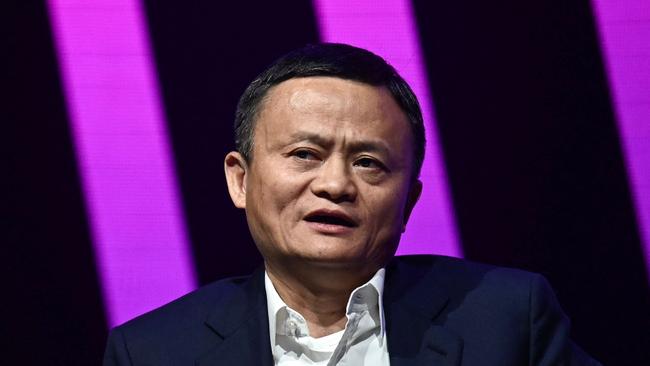China targets firms listed overseas after launching Didi probe
China says it will tighten rules for firms listed overseas or seeking to sell shares abroad, following scrutiny of Didi Global.

China said it would tighten rules for companies listed overseas or seeking to sell shares abroad, moves that could hinder attempts by homegrown firms to raise money in the US.
The shift comes as Chinese regulators intensify scrutiny into technology companies, including Didi Global, that recently listed in the US.
Wall Street has long been a bridge between China’s economic miracle and the US Blockbuster listings of firms like Alibaba Group Holding in New York emphasised China’s rising economic clout while letting American investors profit from their growth.
Now, China’s move toward restricting such listings highlights the diverging visions in Beijing and Washington of the future of technology, data protection and security. With a widening gulf of distrust on a range of issues, both Chinese and American companies could get caught in the middle.
Turmoil around Didi foreshadowed the latest move. The ride-hailing giant has faced a series of regulatory actions at home since its New York stock debut last week. According to people familiar with the matter, Chinese officials suggested it delay its initial public offering, partly amid concerns that the US government could use audit documents that Didi was required to file as a US-listed company to gain access to data on Chinese citizens.
In recent days, a unit of China’s cybersecurity regulator also said it launched data-security reviews into popular mobile apps operated by Full Truck Alliance and Kanzhun, which raised close to $US7 billion in total from US IPOs in June.
The measures could have far-reaching implications for a raft of China’s tech giants that are planning IPOs offshore, and for the global investment firms that hold stakes in them. Many investors bought into fast-growing Chinese start-ups expecting to cash out after the companies list on global exchanges.
In the US, IPO bankers scrambled over the holiday weekend and into Tuesday to understand the directives coming out of China, according to people familiar with the matter. Some fielded calls from furious fund managers who had purchased shares of Didi in its IPO last week, only to watch the company lose a huge chunk of its value—as of midday Tuesday, Didi’s stock was 12 per cent below its IPO price.
A big question on those investors’ minds: Who knew what, when? Didi has said it wasn’t aware of Chinese regulators’ plans to put it under cybersecurity review and ban new downloads of its app ahead of its IPO.
Goldman Sachs Group Inc., Morgan Stanley and JPMorgan Chase & Co were the main underwriters on Didi’s offering. All three firms declined to comment.

Also top of mind for IPO bankers and investors who own US-listed shares of Chinese companies is whether the new guidelines out of China are only about data, or if they represent a sea change from the country that could lead to companies pulling potential US listings.
Either way, a freeze of the Chinese IPO pipeline seems to be the current state of play: Bankers say any Chinese company that was planning a US-listed IPO in the coming months is likely being shelved for now.
Both Beijing and Washington have long seen economic engagement as the cornerstone of the two countries’ ties. But the relationship has become so unpredictable over the years that even the drive to make money in each other’s markets no longer works as a unifier.
In Chinese President Xi Jinping’s vision, Chinese entrepreneurs should put their nation ahead of business interests as the two countries compete for economic and technical advantages. For global investors, the proposed measure is the latest suggestion that the Chinese government could exert its authority to block any deal at the last minute to ensure that companies’ data on Chinese citizens doesn’t slip into US hands.
After Beijing scuttled Ant Group Co’s IPO last year, a multibillion-dollar windfall quickly turned into a nightmare for global investors, who found themselves stuck with shares in the financial-technology giant that wouldn’t soon pay off.
The government said in new guidelines released Tuesday through state-run Xinhua News Agency that regulators need to deepen cross-border co-operation over audit supervision and amend laws and regulations “on data security, cross-border data flow and other confidential information management.”
The guidelines were drafted in the context of “profound changes in the economic and financial environment,” amid what authorities described as mounting lawlessness in the capital market that had made regulatory oversight more challenging, the government said.
“For a long period of time, due to shortcomings of the [regulatory] system, the cost of violations of securities-related crimes has been relatively low,” Yi Huiman, the head of China’s securities regulator, told Xinhua in an interview about the new measures. Now, “financial fraud, insider trading, market manipulation and other illegal activities of listed companies are increasing,” he said. “The capital markets have such power that a slight change could affect everything else in financial operations.”
Chinese companies have raised more than $US75 billion from US IPOs since 2012, according to Dealogic data.
Even as tensions deepened between Beijing and Washington, the US remained a magnet for Chinese tech companies hoping to go public. “There is still a significant appetite among US investors for Asian companies and the US market remains the gold standard for public offerings,” said Drew Bernstein, co-chairman of accounting firm Marcum Bernstein & Pinchuk LLP, whose clients include US-listed Chinese companies.
In the year to date, some 36 companies from China have gone public in the US, the same number as the whole of 2020, according to Dealogic data. Didi’s recent IPO, which raised $US4.4 billion, was the largest since Alibaba Group Holding’s 2014 blockbuster stock sale, which fetched $US25 billion.

In its detailed statement, the Chinese government vowed to revise rules for stock offerings on exchanges outside of China. It also called for more accountability of domestic regulatory bodies and better interagency co-ordination.
The scrutiny is particularly targeted at companies heading to the U.S. for listings, said Bruce Pang, head of macro and strategy research at China Renaissance Securities. He said the move adds pressure “not only on listed tech companies but also the valuation of pre-IPO companies.”
The move also comes as the US tightens rules governing foreign companies listed on its stock exchanges. Congress passed a bill last year—which was signed into law by then-President Donald Trump —that requires the audit papers of U.S.-listed foreign companies be open for U.S. regulatory inspection. Failing to comply for three consecutive years will result in delisting.
Chinese securities regulators have long resisted giving their US counterparts routine access to such audit working papers, citing national-security concerns.
The issue is that Chinese companies’ audit information “may involve the confidentiality of information and data in China,” said Li Daxiao, chief economist at Yingda Securities.
The latest directives could help plug a long-running regulatory loophole that has allowed many Chinese tech companies to raise funds in overseas stock markets without much scrutiny at home.
Chinese internet companies typically adopt a so-called variable interest entity structure that gives them flexibility to raise funds offshore. They are usually registered in offshore tax havens such as the Cayman Islands that fall outside China’s legal jurisdiction.
That has spared the companies from the same regulatory scrutiny and rigorous IPO vetting that is applied to Chinese companies planning to list domestically.
The Chinese government has attempted to close the loophole. It made amendments in its securities law to provide a legal basis for enforcement actions involving overseas-listed Chinese firms. They include penalising overseas capital-markets activities that hurt investors in China. No enforcement has resulted so far.
Last year, after Luckin Coffee Inc. revealed an accounting fraud and said it inflated its sales, the China Securities Regulatory Commission publicly criticised the company’s misdeeds, but it didn’t impose any penalties on Luckin or its executives that were complicit in the scheme.
Luckin is registered in the Cayman Islands and conducts most of its business in China. It was delisted from the Nasdaq Stock Market last summer, a little over a year after it went public.
Wall Street Journal



To join the conversation, please log in. Don't have an account? Register
Join the conversation, you are commenting as Logout